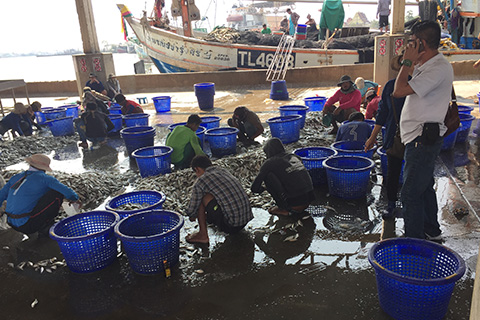
This week, Nestlé and Mars made a public commitment to ban transshipment – the practice of offloading catch from small fishing vessels to large refrigerated cargo ships while receiving fresh stocks of crew, fuel, and supplies. This practice enables vessels to remain out at sea for months or even years at a time. It’s encouraging to see two of the largest producers of pet food worldwide take steps to significantly reduce the risk of slavery tainted products in their supply chains.
In Thailand, where Humanity United works with government, the private sector, and civil society to eradicate forced labor in seafood supply chains, disreputable captains often rely on transshipment to facilitate nefarious activities. Transshipment isn’t always an illegitimate practice: catch and supplies are sometimes transshipped in circumstances that are monitored and regulated, enabling ethical actors to maximize their time out at sea. However, as overfishing has depleted near-shore stock and forced vessels to fish further and further out, the same practice that allows vessels to stay at sea for extended periods of time can also function to keep crew trapped and isolated, allowing vessels to avoid ports and the regulatory checks that are meant to help identify abuses. These vessels are able to offload their catches – often intermingling tainted and clean seafood together in the cargo ship’s hold – and procure new workers to replace those that are weak, overworked and malnourished. As a result, there is little concern or incentive to take care of or retain crew; new labor can always be obtained from the next cargo ship.
With a large number of fishing fleets operating without any sort of vessel monitoring system, and with poor catch documentation and reporting practices, transshipment makes a long and opaque supply chain even more difficult to regulate. Recognizing that transshipment hinders attempts of at-sea regulation, the Thai government last year put a temporary moratorium on the transshipment of aquatic animals outside of Thai waters. They made that ban permanent in September of 2016, also banning the transshipment of seamen. Indonesia has permanently banned transshipment, discovering that the costs of enforcing a ban far outweigh the estimated $20bn that the practice costs the country’s seafood sector annually. Regulation may take time and resources, but the benefits to industry – not to mention to people and to oceans – undoubtedly surpass the costs.
Public pressure has arguably helped to make the business case to Nestlé and Mars for cleaning up their supply chains. But it remains to be seen how policy will translate into practice. Shared accountability from brand to boat is critical to eradicating abusive practices. How various actors along a complex supply chain choose to respond will help to root out the bad actors from those acting in good faith. For the average consumer, it may be easy to lose sight of the sheer amount of inputs that a mega-brand like Nestlé or Mars needs to bring their products to supermarket shelves. That is why their leadership and engagement around these very important and esoteric issues is key in the fight against human trafficking across the globe.
These bans alone have not, of course, solved the problem or eliminated abuses. But a ban is a first step – and an important one.